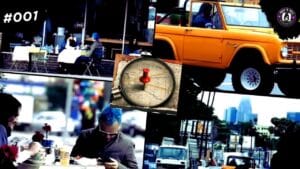“So It Begins”: Miloš Bajat on the Birth of BAYAT and Their Mission
When we first stumbled upon a band called Bayat on the internet, completely by accident, we weren’t entirely sure whether it was a domestic or a foreign band that had somehow slipped under our radar. Just one look at anything related to this band – whether it’s the music, videos, or social media profiles – is enough to get the impression that this is a very serious group which, besides the fantastic music from their debut So It Begins, also demonstrates a high level of professionalism in their approach to their work.
That is why we consider the Novi Sad-based band Bayat one of the true refreshers of the domestic rock/metal scene, and about that, as well as many other interesting things, we spoke with the band’s founder and frontman, Miloš Bajat.
JRS: First of all, congratulations on the release of the album So It Begins, which came out in December 2019. What our readers always want to know, before we dive deeper into the album itself, is how the band Bayat actually came to be.
MB: Thank you! The four of us (the guitarists, bassist, and I) have been working together for about seven years. Until 2018, we played covers and performed under the name Miloš Bajat & Good Company. We didn’t have a clear idea of how exactly to start making original music, and then in 2018, David Kitching appeared—a man who is originally from England but, due to circumstances, has been living in Novi Sad for some time. He had the idea to create the song Lost as a theme for his company, Redbel Amsterdam. When he met the band and when we made the song, we realized that it would actually be our first single for the debut album.
JRS: How did you decide to name the band Bayat? What does that name represent, and was it perhaps considered from the beginning?
MB: As I mentioned above, it was David Kitching—who is also the band’s manager—who came up with the idea of replacing the J in my last name with a Y. Bayat means “an oath of alliance that includes God as a witness,” so the name fit perfectly with our message and mission.
JRS: Your first two singles, Lost and Adrenaline, came out back in 2018, which is also when Junkyard Rock Stories, so to speak, “located” you on its radar. The album contains eight tracks, four of which were already released as singles. How important is it to release singles nowadays?
MB: That has become completely normal; every band today announces their albums with singles—as a little overture to what the audience can expect. It worked well for us because we were just starting out, and each single in a way showed us the audience’s reaction and gave us momentum, as they were well received. In any case, there are many advantages and disadvantages when it comes to singles. In the past, albums had a few standout songs while others stayed in the shadow of the hits. With singles, it’s easier to create that balance, but in the end they always serve well as a trailer for the album they announce.
JRS: Your seemingly most popular track so far, So It Begins, has sparked a lot of interest among listeners worldwide. The story behind it deals with environmental issues and the protection of our planet. Where did the idea to address such a topic come from?
MB: So It Begins is indeed the most listened to, I assume partly because of the topic it deals with. Even though the song was written 5–6 years ago, the topic is extremely relevant now, considering that environmental problems and climate change have unfortunately become our everyday reality. We felt the need to speak up about it. It’s something that worries me the most. If we, as a society, are capable of doing so much harm to the planet, we are just as capable of doing a lot of good. And as the song itself says—that doesn’t require much. We all need to wake up and realize that behind every action, there is responsibility and consequence.
JRS: We completely agree. How does this theme tie into the overall concept of the album So It Begins, and what is the message behind the album?
MB: In our opinion, that is the biggest problem on the planet, and the rest of the album deals with other issues of the 21st century. Among other things, vices that surround us, our human selfishness, and putting wrong moral and life values in the foreground. Which is actually a paradox, because we are supposed to have progressed as a society, yet that’s not the impression one gets when looking at the big picture of today’s trends and what it means to be “successful.” Listeners will ultimately have to derive their own message. Every song carries its own message, and the album is called So It Begins—and the message is right there. Change starts with us, and that’s how everything begins.
JRS: What was the reaction of fans when you started presenting your original songs? Following Bayat’s work for some time now, we got the impression that a band like yours was very much needed on the domestic scene, and you’ve also received support from abroad.
MB: We will see, considering we just started promoting the album through the So It Begins tour. So far, the people who have followed us even before the original music have accepted the album very well. But I must admit that we may have received more support from abroad when it comes to radio stations and web portals. Whether we are needed on the domestic scene—that doesn’t depend on us. In the end, the audience will decide.
JRS: Our impression was exactly this: that your approach toward the audience has been based on the English language from the very beginning—not only through lyrics, but also through social media interactions. What led you to that decision, and what are the advantages or disadvantages of such an approach?
MB: The situation regarding the rock scene here is not very great. My impression is that we would have limited ourselves to the region if we had started working in Serbian, and we simply didn’t want that. There are many reasons why we decided on English, but the basic one is that many more people worldwide can understand us. Our manager is from England, and more or less all of us in the band grew up on music in English, so it was the logical choice.
JRS: Recently you started the So It Begins tour, which we already mentioned. What exactly is planned?
MB: We are currently doing a tour across Serbia, where we will present ourselves to our audience for the first time with our original songs—that is, with the album. For the second half of the year, we plan a tour across the region and Europe.

JRS: One of the striking things about you is how active you are on social media and music streaming platforms. How important is that for a band’s development today?
MB: It turns out it’s very important. And we are discovering that along the way. I can’t say I’m thrilled about that fact, but that’s the time we live in—where performing, talent, social media activity, and streaming platforms are equally important. The advantage is that you can do a lot “from home,” and you are accessible to the whole world, and the world is accessible to you.
JRS: You are one of the bands that regularly appear on our Junkyard playlists, and you’ve helped us promote them a lot, for which we are extremely grateful. How important are playlists in the world of digital music, in your opinion?
MB: Mutual support is very important. It means a lot to us, and we are extremely grateful to everyone who helps us in any way at the very beginning, and we gladly return the support. Playlists have become one of the serious sources of income—not only for big bands but also for developing ones. Therefore, they’ve become very important. It’s an excellent way to promote music, especially among younger generations who were born into the digital age.
JRS: The music that Bayat plays was once described by us as modern rock/metal. How would you describe your music to someone who has never heard you before?
MB: That’s a very difficult question. There are so many genres and subgenres now that it all seems a bit confusing. At our core, we are a rock/metal band—what I can say for sure is that we lean into alternative rock and a bit into nu-metal. But RnR will always be our foundation, and I wouldn’t limit us too much by subgenres.
JRS: You performed for a while with the legendary group Generacija 5. Are you still their singer, and what has your experience been like working with them? How does that fit with your obligations in Bayat?
MB: Yes, I still perform with them. The experience is incredible. The mere fact that I listened to their music as a kid and now share the stage with such rock legends is simply unbelievable. Every performance with them takes me back to those happy rock days of the 80s. For now, everything works without problems, and we manage to keep up with both bands.
JRS: What is your opinion about the domestic rock and metal scene in general?
MB: Hmm… I’m not sure I can answer that question. From my point of view, there is no domestic rock/metal scene. There are individuals who support rock and metal in the region, and those are mostly bands that have been around for a long time—but they do exist. Things are a bit mixed up in our region. We definitely need more support and media space to create a real scene. And of course, to remove politics from the equation. Then we can talk about a rock scene.
JRS: Your album, as we said, contains eight songs. However, you recently announced that this is only the first part of a trilogy. Since everything revolves around the slogan So It Begins, what is Bayat actually trying to tell us? What has begun, and what can we expect in the future?
MB: The basic idea is indeed a trilogy, but we will see where it goes. The main message is that the beginning of change starts with us. We are working on the second album, but I wouldn’t reveal the theme just yet. You’ll be able to figure it out yourselves from the singles that will come out later this year. What you can definitely expect is honesty and a heavy sound.
JRS: Sounds great! We can’t wait for the new songs and album. We wish you success on the tour, and thank you especially for your time and the pleasant conversation!
MB: Thank you, and once again, thank you for the support!
This interview is originally conducted and posted in March 2020 on the old Junkyard website. This is the translated version that we are posting now for the first time.
Photos: Shka Bajat




